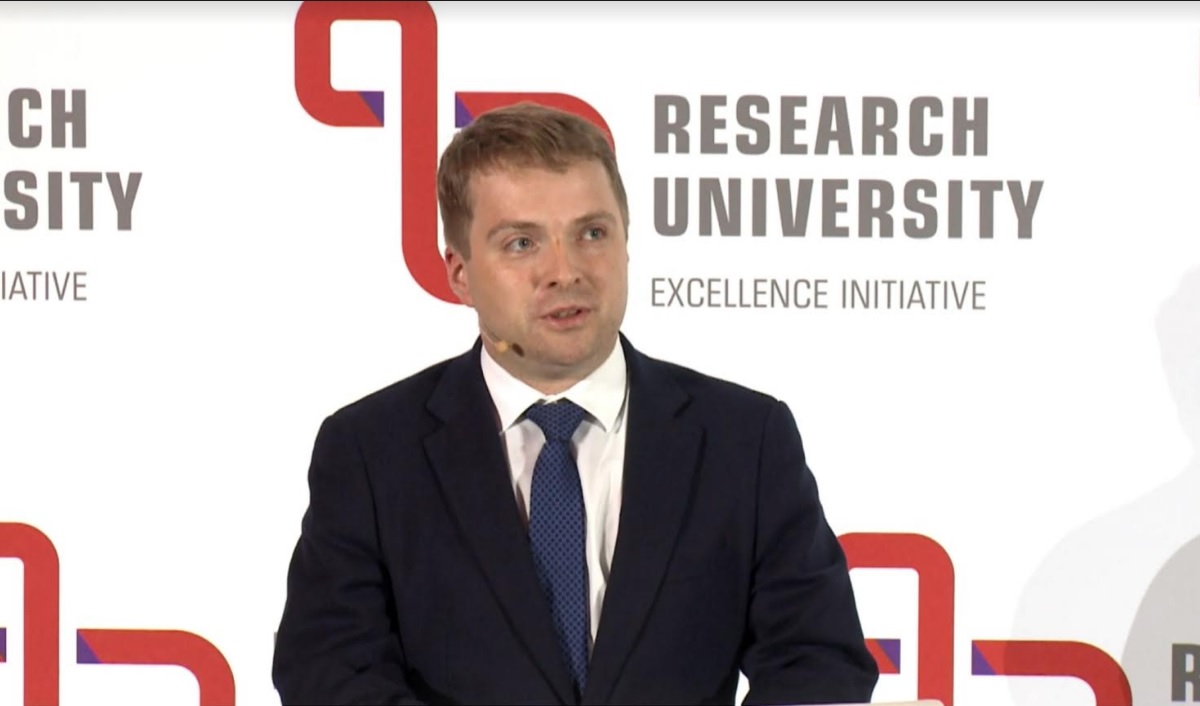In THE Emerging Economics Ranking institutions are ranked using THE World University Ranking Indicators, but assigning different weights to each indicator. This ranking includes only universities in countries classified by the London Stock Exchange’s FTSE Group, where Hungary is listed as advanced emerging country.
In this ranking, both the learning environment and research are ranked 30%, while research influence is only 20% (compared to 30% in World University Ranking), and international outlook and knowledge transfer both weight 10-10% (as opposed to 7.5% and 2.5%).
Source: https://www.timeshighereducation.com/sites/default/files/emergingeconomies2020methodologytable.jpg
At first, in 2014 THE Emerging Economies ranked the top 100 institutes, then the number of ranked institutions rose to 200 and 300, and this year the rankings of more than 500 institutions from 47 countries were announced. The number of rival institutions for Hungarian universities decreased, because since 2019 Poland is not included in this ranking, as FTSE Russell announced the promotion of Poland to Developed market status. The number of examined institutions in the recent analysis is 36 from 7 different countries (beside Hungary Croatia, Czech Republic, Romania, Serbia, Slovakia, Slovenia are included).
The best performing Hungarian university is still Semmelweis (70th) Though it fell back 3 places from last year’s rank, its scores are outstanding in the indicators of citations, international outlook and teaching among Hungarian participants. In industry income BME (231-300th) scored the highest, while ELTE is the best in research comparing to other Hungarian universities.
|
Rank |
Name | Overall | Citations | Industry Income | International Outlook | Research |
Teaching |
| 70 | Semmelweis University | 37.5 | 74 | 36.2 | 75.1 | 12.3 | 26.2 |
| 149 | Eötvös Loránd University | 30.2 | 48.2 | 35.1 | 52.8 | 17.7 | 21.4 |
| 176 | University of Pécs | 28.2 | 40.9 | 37.5 | 56 | 16.1 | 19.6 |
| 201–250 | University of Szeged | 25.0–27.2 | 36.6 | 36.5 | 54.5 | 12.4 | 21.8 |
| 251–300 | Budapest University of Technology and Economics | 22.7–24.9 | 25.3 | 44 | 34.8 | 15.8 | 17.4 |
| 251–300 | University of Debrecen | 22.7–24.9 | 28 | 37.7 | 55.7 | 10.6 | 19.9 |
| 301–350 | Corvinus University of Budapest | 20.9–22.6 | 23.6 | 34.4 | 44.7 | 13.7 | 17.8 |
| 351–400 | Szent István University | 19.1–20.8 | 17.8 | 35.4 | 40.2 | 10.5 | 16.5 |
Comparing to previous years, except for BME and Corvinus, each Hungarian institutes crawled back in their ranking places, despite of some increasing indicator scores. Greatest downturn is seen at Szeged, Pécs and ELTE: all of the three universities worsened 30 or more places in comparison to previous year. Debrecen transferred from 251-300th to 301-350th. Szent István University is a new entrant, ranked 351-400th.
|
2019 –› 2020 |
Rank | Overall | Citations | Industry Income | International Outlook | Research |
Teaching |
| Semmelweis University | -3 | 2 | 7.6 | 0.2 | -2.8 | 0.3 | 2 |
| Eötvös Loránd University | -30 | 1 | 3.7 | -0.4 | -0.4 | -0.6 | 1.5 |
| University of Pécs | -35 | 0.6 | 3.3 | -1.5 | 0.6 | -0.6 | 0.8 |
| University of Szeged | -39 | -0.4 | -4.6 | -0.8 | 1.8 | 1.3 | 2 |
| Budapest University of Technology and Economics | 0 | 2.85 | -1.2 | 0.1 | 0.7 | 1.6 | 2.3 |
| University of Debrecen | -50 | 0.45 | 3.5 | -4 | 4 | 2.2 | 0.8 |
| Corvinus University of Budapest | 0 | 2.9 | 3.3 | 0.2 | 1.9 | 2.5 | 2.3 |
| Szent István University | new entrant | ||||||
Similar tendency appears when examining rival institutions. There are four more new entrants beside Hungarian Szent István University, three of them are in Czech Republic, and one from Romania.
From 24 universities there is only one which was able to step up: Palacky turned out to be 145th after last year’s 155th place. Although it is not surprising, as the university increased its scores in every indicator, producing a higher overall score.
|
Palacky University |
Overall | Citations | Industry Income | International Outlook | Research |
Teaching |
| 2019 | 26.9 | 42.5 | 34.8 | 57.2 | 11.8 | 18.9 |
| 2020 | 30.4 | 46.9 | 35.4 | 57.5 | 18.3 | 20.9 |
The rest of the institutions – except for Tomas Bata University in Zlín, who stagnate – lost their previous positions. The most conspicuous are those, who crawled back more than 30 places or more than one category.
|
University |
Country | 2019 (overall 2019) |
2020 (overall 2020) |
| University of Split | Croatia | 124 (28.8) | 183 (27.9) |
| Masaryk University | Czech Republic | 106 (30.4) | 136 (31.4) |
| Babes-Bolyai University | Romania | 166 (26.1) | 201-250 (25.0-27.2) |
| Universitatea de Vest dinn Timisoara | Romania | 301-350 (17.9-19.8) | 401-500 (15.8-19.0) |
| University of Bucharest | Romania | 201-250 (22.1–24.6) | 401-500 (15.8-19.0) |
| Slovak University of Technology Bratislava | Slovakia | 301-350 (17.9-19.8) | 401-500 (15.8-19.0) |
| University of Maribor | Slovenia | 182 (25.3) | 251-300 (22.7-24.9) |
As expected due to the increase in the number of featured institutions, overall scores and lower bounds of category intervals are getting higher, while related positions are lower. At the same time, we need to keep in mind, that some universities overall scores decreased and this is a straight line to a worse position, as sometimes higher scores are not enough either to higher position (which does not necessarily mean that one’s actual performance is worse, compared to previous years).
THE Emerging Economies was not favorable for the Hungarian and their rival institutions. With a slight improvement, most of the rankings show decline.
 Dr. habil György Fábri (1964) is an habilitated associate professor (Institute of research on Adult Education and Knowledge Management, Faculty of Education and Psychology of Eötvös Loránd University), head of the Social Communication Research Group. Areas of research: university philosophy, sociology of higher education and science, science communication, social communication, church sociology. His monograph was published on the transformation of Hungarian higher education during the change of regime (1992 Wien) and on university rankings (2017 Budapest). He has edited several scientific journals, and his university courses and publications cover communication theory, university philosophy, science communication, social representation, media and social philosophy, ethics, and church sociology.
Dr. habil György Fábri (1964) is an habilitated associate professor (Institute of research on Adult Education and Knowledge Management, Faculty of Education and Psychology of Eötvös Loránd University), head of the Social Communication Research Group. Areas of research: university philosophy, sociology of higher education and science, science communication, social communication, church sociology. His monograph was published on the transformation of Hungarian higher education during the change of regime (1992 Wien) and on university rankings (2017 Budapest). He has edited several scientific journals, and his university courses and publications cover communication theory, university philosophy, science communication, social representation, media and social philosophy, ethics, and church sociology.
 Dr. Mircea Dumitru is a Professor of Philosophy at the University of Bucharest (since 2004). Rector of the University of Bucharest (since 2011). President of the European Society of Analytic Philosophy (2011 – 2014). Corresponding Fellow of the Romanian Academy (since 2014). Minister of Education and Scientific Research (July 2016 – January 2017). Visiting Professor at Beijing Normal University (2017 – 2022). President of the International Institute of Philosophy (2017 – 2020). President of Balkan Universities Association (2019 – 2020). He holds a PhD in Philosophy at Tulane University, New Orleans, USA (1998) with a topic in modal logic and philosophy of mathematics, and another PhD in Philosophy at the University of Bucharest (1998) with a topic in philosophy of language. Invited Professor at Tulsa University (USA), CUNY (USA), NYU (USA), Lyon 3, ENS Lyon, University of Helsinki, CUPL (Beijing, China), Pekin University (Beijing, China). Main area of research: philosophical logic, metaphysics, and philosophy of language. Main publications: Modality and Incompleteness (UMI, Ann Arbor, 1998); Modalitate si incompletitudine, (Paideia Publishing House, 2001, in Romanian; the book received the Mircea Florian Prize of the Romanian Academy); Logic and Philosophical Explorations (Humanitas, Bucharest, 2004, in Romanian); Words, Theories, and Things. Quine in Focus (ed.) (Pelican, 2009); Truth (ed.) (Bucharest University Publishing House, 2013); article on the Philosophy of Kit Fine, in The Cambridge Dictionary of Philosophy, the Third Edition, Robert Audi (ed.) (Cambridge University Press, 2015), Metaphysics, Meaning, and Modality. Themes from Kit Fine (ed.) (Oxford University Press, forthcoming).
Dr. Mircea Dumitru is a Professor of Philosophy at the University of Bucharest (since 2004). Rector of the University of Bucharest (since 2011). President of the European Society of Analytic Philosophy (2011 – 2014). Corresponding Fellow of the Romanian Academy (since 2014). Minister of Education and Scientific Research (July 2016 – January 2017). Visiting Professor at Beijing Normal University (2017 – 2022). President of the International Institute of Philosophy (2017 – 2020). President of Balkan Universities Association (2019 – 2020). He holds a PhD in Philosophy at Tulane University, New Orleans, USA (1998) with a topic in modal logic and philosophy of mathematics, and another PhD in Philosophy at the University of Bucharest (1998) with a topic in philosophy of language. Invited Professor at Tulsa University (USA), CUNY (USA), NYU (USA), Lyon 3, ENS Lyon, University of Helsinki, CUPL (Beijing, China), Pekin University (Beijing, China). Main area of research: philosophical logic, metaphysics, and philosophy of language. Main publications: Modality and Incompleteness (UMI, Ann Arbor, 1998); Modalitate si incompletitudine, (Paideia Publishing House, 2001, in Romanian; the book received the Mircea Florian Prize of the Romanian Academy); Logic and Philosophical Explorations (Humanitas, Bucharest, 2004, in Romanian); Words, Theories, and Things. Quine in Focus (ed.) (Pelican, 2009); Truth (ed.) (Bucharest University Publishing House, 2013); article on the Philosophy of Kit Fine, in The Cambridge Dictionary of Philosophy, the Third Edition, Robert Audi (ed.) (Cambridge University Press, 2015), Metaphysics, Meaning, and Modality. Themes from Kit Fine (ed.) (Oxford University Press, forthcoming). Mr. Degli Esposti is Full Professor at the Department of Computer Science and Engineering, Deputy Rector Alma Mater Studiorum Università di Bologna, Dean of Biblioteca Universitaria di Bologna, Head of Service for the health and safety of people in the workplace, President of the Alma Mater Foundation and Delegate for Rankings.
Mr. Degli Esposti is Full Professor at the Department of Computer Science and Engineering, Deputy Rector Alma Mater Studiorum Università di Bologna, Dean of Biblioteca Universitaria di Bologna, Head of Service for the health and safety of people in the workplace, President of the Alma Mater Foundation and Delegate for Rankings.

 Ben joined QS in 2002 and has led institutional performance insights function of QS since its emergence following the early success of the QS World University Rankings®. His team is, today, responsible for the operational management of all major QS research projects including the QS World University Rankings® and variants by region and subject. Comprising over 60 people in five international locations, the team also operate a widely adopted university rating system – QS Stars – and a range of commissioned business intelligence and strategic advisory services.Ben has travelled to over 50 countries and spoken on his research in almost 40. He has personally visited over 50 of the world’s top 100 universities amongst countless others and is a regular and sought after speaker on the conference circuit.Ben is married and has two sons; if he had any free time it would be spent reading, watching movies and skiing.
Ben joined QS in 2002 and has led institutional performance insights function of QS since its emergence following the early success of the QS World University Rankings®. His team is, today, responsible for the operational management of all major QS research projects including the QS World University Rankings® and variants by region and subject. Comprising over 60 people in five international locations, the team also operate a widely adopted university rating system – QS Stars – and a range of commissioned business intelligence and strategic advisory services.Ben has travelled to over 50 countries and spoken on his research in almost 40. He has personally visited over 50 of the world’s top 100 universities amongst countless others and is a regular and sought after speaker on the conference circuit.Ben is married and has two sons; if he had any free time it would be spent reading, watching movies and skiing.
 Anna Urbanovics is a PhD student at Doctoral School of Public Administration Sciences of the University of Public Service, and studies Sociology Master of Arts at the Corvinus University of Budapest. She is graduated in International Security Studies Master of Arts at the University of Public Service. She does research in Scientometrics and International Relations.
Anna Urbanovics is a PhD student at Doctoral School of Public Administration Sciences of the University of Public Service, and studies Sociology Master of Arts at the Corvinus University of Budapest. She is graduated in International Security Studies Master of Arts at the University of Public Service. She does research in Scientometrics and International Relations.


 Since 1 February 2019 Minister Palkovics as Government Commissioner has been responsible for the coordination of the tasks prescribed in Act XXIV of 2016 on the promulgation of the Agreement between the Government of Hungary and the Government of the People’s Republic of China on the development, implementation and financing of the Hungarian section of the Budapest-Belgrade Railway Reconstruction Project.
Since 1 February 2019 Minister Palkovics as Government Commissioner has been responsible for the coordination of the tasks prescribed in Act XXIV of 2016 on the promulgation of the Agreement between the Government of Hungary and the Government of the People’s Republic of China on the development, implementation and financing of the Hungarian section of the Budapest-Belgrade Railway Reconstruction Project.


 He is the past President of the Health and Health Care Economics Section of the Hungarian Economics Association.
He is the past President of the Health and Health Care Economics Section of the Hungarian Economics Association.

 Based in Berlin, Zuzanna Gorenstein is Head of Project of the German Rectors’ Conference (HRK) service project “International University Rankings” since 2019. Her work at HRK encompasses the conceptual development and implementation of targeted advisory, networking, and communication measures for German universities’ ranking officers. Before joining the HRK, Zuzanna Gorenstein herself served as ranking officer of Freie Universität Berlin.
Based in Berlin, Zuzanna Gorenstein is Head of Project of the German Rectors’ Conference (HRK) service project “International University Rankings” since 2019. Her work at HRK encompasses the conceptual development and implementation of targeted advisory, networking, and communication measures for German universities’ ranking officers. Before joining the HRK, Zuzanna Gorenstein herself served as ranking officer of Freie Universität Berlin.
 His books on mathematical modeling of chemical, biological, and other complex systems have been published by Princeton University Press, MIT Press, Springer Publishing house. His new book RANKING: The Unwritten Rules of the Social Game We All Play was published recently by the Oxford University Press, and is already under translation for several languages.
His books on mathematical modeling of chemical, biological, and other complex systems have been published by Princeton University Press, MIT Press, Springer Publishing house. His new book RANKING: The Unwritten Rules of the Social Game We All Play was published recently by the Oxford University Press, and is already under translation for several languages.
